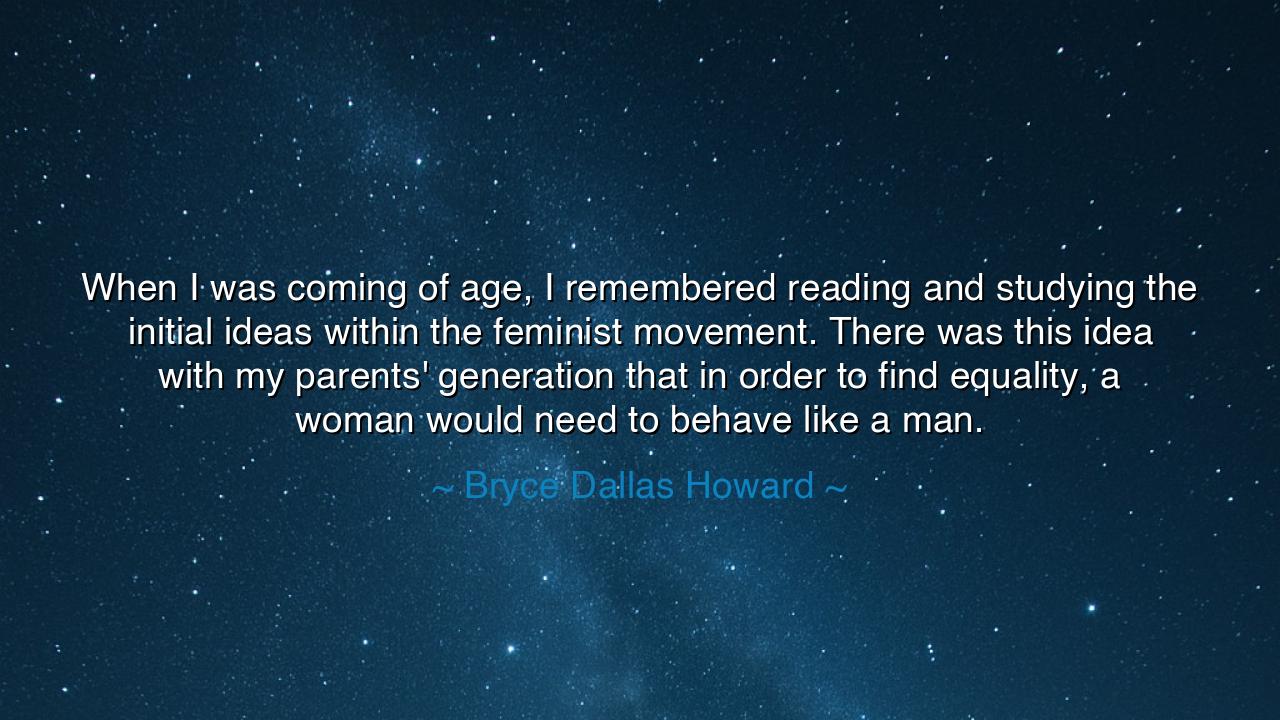
When I was coming of age, I remembered reading and studying the
When I was coming of age, I remembered reading and studying the initial ideas within the feminist movement. There was this idea with my parents' generation that in order to find equality, a woman would need to behave like a man.






“When I was coming of age, I remembered reading and studying the initial ideas within the feminist movement. There was this idea with my parents’ generation that in order to find equality, a woman would need to behave like a man.” — Bryce Dallas Howard
In these thoughtful and reflective words, Bryce Dallas Howard speaks not merely as an artist or observer, but as a bridge between generations — between those who fought for feminist equality and those who have begun to redefine its meaning. Her reflection reveals a profound truth about the evolution of women’s liberation: that the earliest battles for freedom were often fought on the terrain of imitation, where women were told that equality meant mirroring the behaviors, ambitions, and temperaments of men. It was a noble struggle born in courage, yet it carried within it an unseen wound — the implication that the feminine itself was somehow lesser.
The origin of this quote lies in Howard’s personal meditation on gender, identity, and history. As the daughter of filmmaker Ron Howard, she grew up amid the transformations of modern Hollywood, a world deeply influenced by both sexism and progress. Reflecting on her studies and the writings of early feminists, she observed how her mother’s generation — the daughters of the 1960s and 1970s — were taught that to gain respect, a woman must adopt the posture of men: assertive, unyielding, emotionless, and strong in the way the world defined strength. Yet, in her own time, Howard recognized that true equality does not mean assimilation; it means freedom — the freedom to embody both strength and softness, intellect and emotion, logic and intuition.
Her words echo a wisdom as old as humanity itself: that every force of creation is balanced between dualities — between sun and moon, fire and water, reason and feeling. In the ancient myths, the goddess did not bow before the god, nor did she seek to become him; she stood beside him, radiant in her own power. When societies lost this sacred balance, when they exalted the masculine and silenced the feminine, they grew powerful in conquest but barren in spirit. Howard’s reflection is thus a return to an older truth — that equality cannot be found in mimicry, but in mutual reverence.
Consider the story of Hypatia of Alexandria, the philosopher and mathematician of the 4th century. In an age when women were silenced, she dared to teach men, to debate them, to excel in fields they claimed as their own. Yet she did not seek to become like them; she retained her grace, her compassion, and her devotion to wisdom as one whole being. Her power was not borrowed from masculinity — it was born of her own essence. Like Hypatia, modern women are called not to reject their femininity in the pursuit of freedom, but to wield it as their greatest strength.
Howard’s observation reveals that the early feminist movement, though transformative, carried the mark of its time — a world still defined by patriarchy’s terms. To claim equality, women had to enter men’s arenas, speak their language, and adopt their ways. It was an act of rebellion and necessity, yet it left many wondering if liberation meant losing something sacred. The next generation — Howard’s generation — began to ask a different question: not “How can I be equal to men?” but “How can I be free to be myself?” In that shift lies the evolution of the feminine spirit — from resistance to wholeness.
Her reflection calls to all who listen: that balance, not dominance, is the truest form of equality. The world does not need more sameness; it needs the full symphony of human potential. A woman should not have to harden her heart to be respected, nor should a man have to silence his gentleness to be strong. When each person honors both the masculine and feminine within — the drive to build and the gift to nurture — society moves closer to harmony.
Let this teaching be carried forward: equality is not imitation, but integration. It is not the erasure of difference, but the celebration of it. To the women who walk the path of freedom, remember that your worth does not depend on how closely you resemble the powerful, but on how deeply you embody your truth. To the men who seek justice, remember that strength without empathy is hollow. As Bryce Dallas Howard teaches, the next chapter of equality will not be written in the language of competition, but in the music of balance — where every voice, whether soft or strong, joins in the eternal song of human wholeness.






AAdministratorAdministrator
Welcome, honored guests. Please leave a comment, we will respond soon